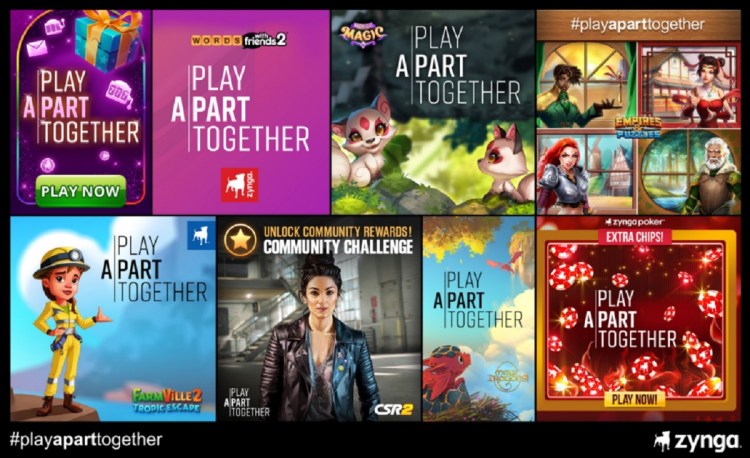Zynga reported record revenue and bookings in the first quarter ended March 31 as more people turned to social mobile games while isolated because of the pandemic. But payouts to acquired companies that are producing these hit games have hurt the bottom line.
While the increase in mobile gameplay due to the pandemic was good for the company in the last two weeks of the quarter, Zynga didn’t have any particular big hits that launched during the quarter.
But in terms of costs, the payouts to Small Giant Games and Gram Games led to a larger than expected loss. The problem is that, because of accounting rules, Zynga can’t recognize the revenue for the acquired companies as quickly as it is required to recognize the expenses.
Revenue was $404 million in Q1, up 52% from a year ago, while bookings were $425 million, up 18%, thanks to good results from Empires & Puzzles, Merge Magic, and Merge Dragons — games that San Francisco-based Zynga acquired in acquisitions. The company reported a GAAP net loss of 11 cents a share, or $103.9 million, compared to a loss of 14 cents a share, or $128.8 million in the first quarter of 2019.
June 5th: The AI Audit in NYC
Join us next week in NYC to engage with top executive leaders, delving into strategies for auditing AI models to ensure fairness, optimal performance, and ethical compliance across diverse organizations. Secure your attendance for this exclusive invite-only event.
On a GAAP basis, analysts had expected a loss per share of 2 cents on bookings of $407 million. As usual, it’s a bit hard to parse due to the way Zynga has to report its revenues and earnings due to regulatory requirements. Zynga itself had expected $400 million in bookings and a loss of 3 cents.
But CEO Frank Gibeau said in an interview with GamesBeat that the company has to defer a considerable amount of the revenue to future quarters, based on accounting rules for deferred revenue. When a player buys a pack of virtual items they may use in a game, Zynga typically spreads the recognition of that revenue out over 10 months, rather than recording the revenue in the current quarter. Zynga has a balance of about $453 million in deferred revenue, which will help the company’s performance in future quarters.
“It’s a strange time for the world. Games have really stepped to the forefront in being a great way to keep people connected and socializing and playing,” Gibeau said. “This is probably the most meaningful time in terms of what our products do for society. The feedback coming back from our fans has been really positive.”
In after-hours trading, Zynga’s stock is falling 5.7% to $7.53 a share.
One of the things that affects Zynga’s earnings is strong performance from the acquired companies Small Giant Games (maker of Empires & Puzzles) and Gram Games (maker of Merge Dragons), both acquired in 2018. The only trouble is that contingent consideration expenses (performance bonuses) related to those deals raises Zynga’s expenses as it has to pay bonuses to those divisions. It would probably be better for the financial picture if homegrown games like Words With Friends performed better, but that’s not what it is happening at the moment, with the exception of good performance from Game of Thrones: Slots Casino.
“These types of payments are going to be coming through the P&L, and it’s part of the deal structure we put in place,” Gibeau said. “It’s a good news, bad news thing. The good news is the products are absolutely crushing it and are well ahead of the deal models we used to acquire the companies. Contingent consideration [bonuses] goes up. Deferred revenue goes up. And it pushes out a lot of the revenue but you have to record the costs now.”
In addition to the acquired games, Zynga has a half-dozen strong titles that keep performing well every quarter — its “Forever Franchises” such as Zynga Poker and CSR2. Zynga is keeping those games strong through live operations, such as special events or new in-game items.
Some games are weakening, like older mobile titles and chat games. But Zynga has plans for some big launches, with upcoming games FarmVille 3, Harry Potter match-3, and Puzzle Combat. And Gibeau said the company felt good about the launch of Play Apart Together, a campaign that promotes the physical distancing during the pandemic as advocated by the World Health Organization (WHO). More than 55 companies banded together during recent weeks to promote the campaign.
Financial results
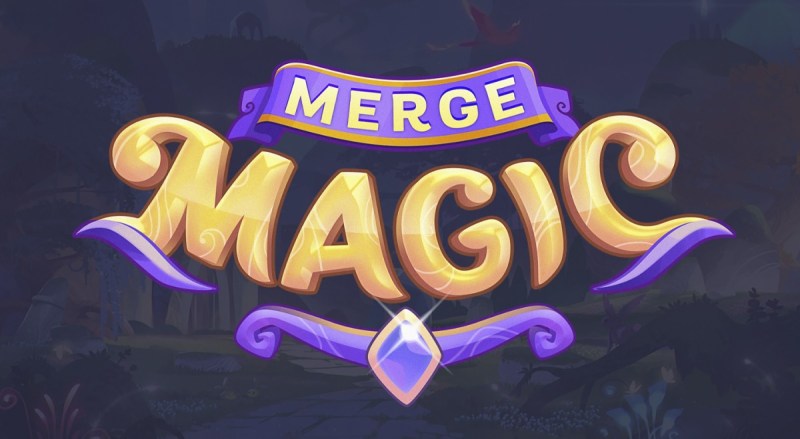
Above: Merge Magic
The stock market reaction to Zynga’s results are usually driven by whether it hits revenue or earnings targets. But it’s complicated because Zynga is required to report some revenue later than when it actually receives it (like when a user buys in-game currency but doesn’t use it until much later). This is called deferred revenue. But if you add the changes in deferred revenue and revenue, you get a better picture of the actual quarter’s results in a number dubbed bookings. Zynga’s management uses this number in how it guides expectations.
Zynga’s actual earnings results for the first quarter fell short of expectations, with a loss per share of 11 cents, or $103.9 million, compared to a loss of 14 cents a share, or $128.8 million, a year earlier. Zynga had guided analysts to a net loss of $26 million, adjusted EBITDA of $57 million, and a net loss of $57 million. Adjusted EBITDA came in at $68 million, about $11 million above guidance.
One of the things that was weaker in the quarter was advertising revenue and bookings, which were $59 million, down 9% from a year ago, as the company saw some pullback in advertising in mid-March. Still, this negative was offset by stronger player engagement during the quarter. Gibeau said advertisers for Zynga’s games did not cut back as much as larger brands did on spending elsewhere.
“In general, our ad business is hanging in there,” Gibeau said. “It’s down a little bit, but it is hanging in there.”
Zynga saw a lower net increasing deferred revenue, which helped improve GAAP gross profit margins, which hit 64% in Q1 compared to 54% a year ago. GAAP operating expenses were also lower in the quarter, though Zynga saw some costs rise from marketing and bonuses paid to acquired companies. Zynga had expected to pay a bonus of $25 million in the quarter, but the acquired companies did so well that the bonus was actually $120 million, much higher and resulting in the net loss.
As a public company, Zynga is required to report quarterly results on a U.S. GAAP basis, while analysts and investors use non-GAAP financial metrics to assess a company’s underlying performance. Bookings and adjusted earnings before income tax, depreciation, and amortization (EBITDA), excluding the impact of deferred revenue, are among those metrics that are most highly scrutinized as they reflect the actual operating activity of the company better.
How well Zynga performs on EBITDA versus analyst expectations is another thing that determines whether the stock rises or falls after earnings.
Zynga’s stock price is also affected by how the company predicts it will do in the second quarter and the outlook for the full year. Zynga has raised its full-year guidance to $1.65 billion in revenues, up 25% from 2019, or rosier than previously expected. Overall, Zynga’s cash position is strong at $1.43 billion.
User numbers
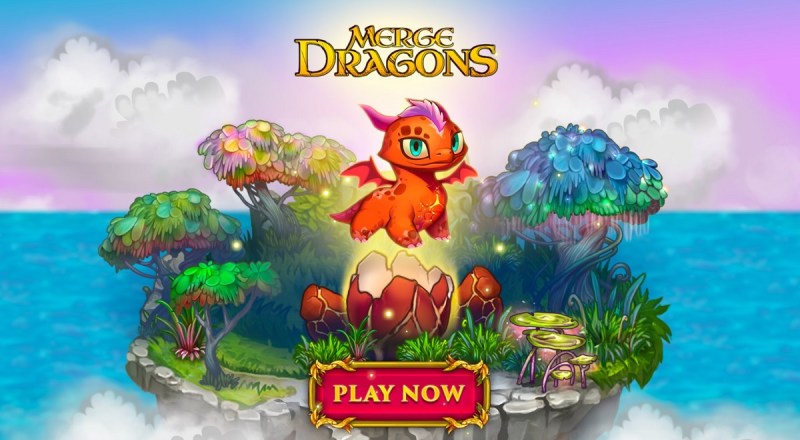
Above: Gram Games’ Merge Dragons.
In Q1, the average mobile daily active users (DAUs) were 21 million, and mobile monthly active users were 68 million, down 7% and 5% respectively from a year earlier, respectively. Merge Magic grew its audience, but older mobile titles, Words With Friends, and chat games saw decreases in mobile DAUs, while chat games and older mobile titles saw decreases in mobile MAUs. Bookings per average mobile DAU was up 27% from a year earlier. Sequentially, Q1 mobile DAUs and mobile MAUs increased modestly, led by growth in casual cards and Words With Friends.
Since late March, as more people sheltered-in-place, Zynga has seen higher levels of engagement in games and it expects this to positively affect Q2 mobile DAUs and MAUs. On a sequential basis, Gibeau said he expects the number of users to go up in the second quarter.
Game performance

Above: Alec Baldwin has teamed up with Zynga on Words With Friends.
CSR2 added a new feature dubbed Elite Customs during the quarter, which lets players customize and upgrade their car collections. And Zynga is working with Universal Brand Development and Digital Platforms to bring Fast & Furious cars to the racing game.
Empires & Puzzles delivered its best revenue and bookings quarter, thanks to the launch of a new battle pass system that rewards players for completing tasks. It also introduced Season 3 with a new land with Norse gods. Merge Dragons and Merge Magic saw a lot of live events updates. The social slots games hit a record quarter in revenues and bookings with strong performance for themed events.
Words With Friends had a strong quarter in installs and reactivations in March, as players dealt with the pandemic. Late in the second quarter, Zynga will introduce Duels, a new social competitive game mode that rewards players for bringing new and lapsed players back into the fold. And Zynga Poker had a boost from a variety of themed events in the quarter as well as a new quick chat feature.
Growth plans

Above: Empires & Puzzles’ Season 3 helped Zynga this quarter.
Zynga said it continues to believe in the long-term potential of games despite the uncertainty around the duration of the pandemic. The company plans to grow through live services growth, creating new forever franchises (those that can generate more than $100 million a year for five years), investing in new platforms, and acquisitions.
Zynga’s top franchises include a diverse mix: CSR Racing, Empires & Puzzles, Merge Dragons, Words With Friends, and Zynga Poker. The newer Merge Magic is promising, and the company still operates social slots and casual card games. Since late March, the company has seen strong reactivations from lapsed players as they cope with self-isolation.
“It was a strong quarter for us all the way through,” Gibeau said. “In the last two weeks, we started to see an uptick. It was already a strong quarter for us. A lot of the impact you will see from shelter-in-home and increases in engagement will impact our Q2 numbers.”
Zynga’s teams are working from home, and the company sees no major work disruptions happening. In March, Zynga began testing its Harry Potter: Puzzles and Spells match-3 title, and it is also testing Puzzle Combat and FarmVille 3. Those games are expected to debut in the second half of the year.
Gibeau also said that Zynga’s move to self-publish Empires & Puzzles in Asia is getting positive results. That is generating good international results for Zynga.
“I’m pleased to see us get into a much more balanced configuration there,” Gibeau said.
And Zynga is experimenting with titles like Tiny Royale on Snapchat’s Snap Games platform, as well as Words With Friends and Draw Something on Facebook Instant Games.
Q2 guidance
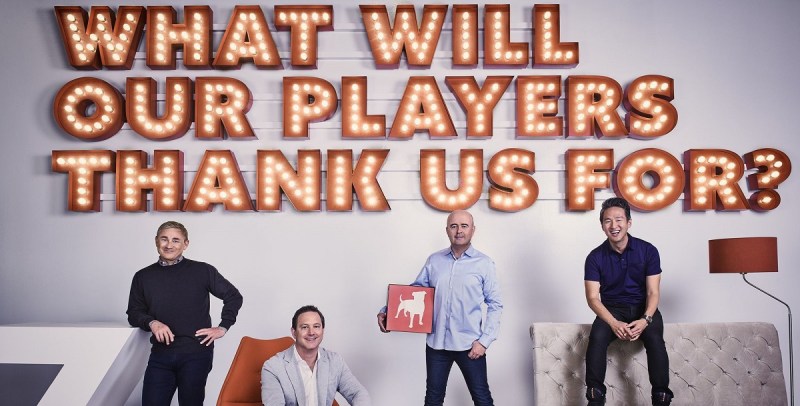
Above: Zynga’s leaders (left to right): CEO Frank Gibeau, Matthew Bromberg, Ger Griffin, and Bernard Kim.
For the second quarter ending June 30, Zynga expects revenue of $400 million, up 31% from the same quarter a year ago, while bookings are expected to be $460 million, up 22%. Live services will drive the performance, as existing titles will continue to generate good revenue. The revenue and bookings numbers are well ahead of forecasts, Gibeau said.
“As we moved into, and May has just started, we see the positive impact of increased engagement,” Gibeau said.
The year-ago comparisons will be favorable with the additions of titles such as Merge Magic and Game of Thrones: Slots Casino.
“Those games are on a really good run,” Gibeau said. “In Q2, one of the standouts is Words With Friends.”
This momentum will be offset a bit by declines in older mobile and web titles. User pay will be a bigger driver of growth while advertising will be weaker because of pressure from the pandemic, which is prompting brands to pull back from advertising.
Zynga doesn’t expect to launch new games in the second quarter. It anticipates a loss of $60 million in the second quarter and adjusted EBITDA of $32 million. Excluding the impact of deferred revenue, the EBITDA would be $92 million.
Expectations for the year
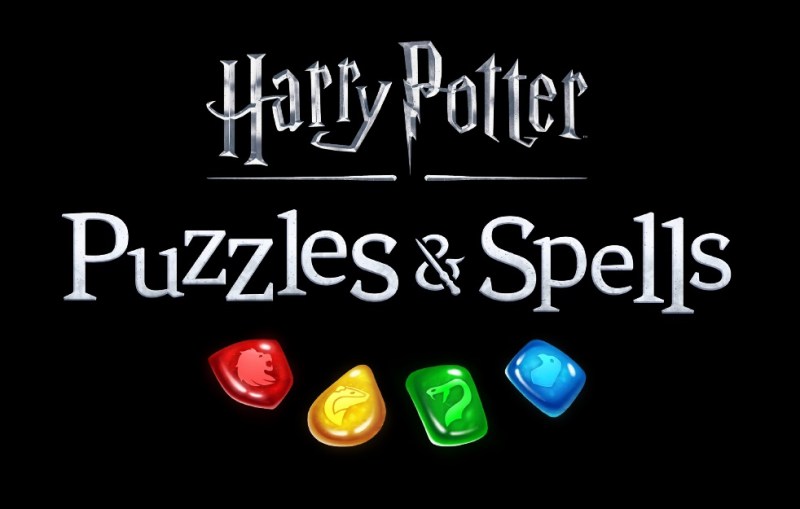
Above: Harry Potter: Puzzles & Spells is coming soon from Zynga.
For the full year, Zynga raises its full-year 2020 revenues and bookings guidance by $50 million. Revenues are now expected to be $1.65 billion in revenue, up 25% from 2019, and bookings of $1.8 billion, up 15%.
The guidance assumes that live services will drive the vast majority of the overall performance as existing big titles are expected to do well throughout 2020. New games are expected to debut in the second half of the year. While advertising could decline modestly, growth in user spending is expected to more than offset that.
Overall, Zynga expects a net loss of $245 million for the year and adjusted EBITDA of $210 million (up $123 million from 2019 due to stronger operating performance and a lower increase in deferred revenue). About $200 million of that loss will be “contingent consideration expense,” or bonuses that Zynga may have to pay to its acquired companies if they hit their targets. Zynga now owns 86.7% of Small Giant Games, and it will acquired the reminder in the first quarter of the next two years.
The company will spend more money on marketing as it launches new games. While performance is expected to be strong in the first half, it’s not clear how the COVID-19 crisis will change business in the latter part of the year.
Zynga has 1,908 employees, up from 1,883 employees in the previous quarter. The studios in Europe, the Middle East, and Asia grew, with a little decline in Canada and the U.S.
